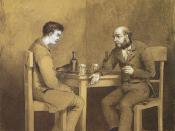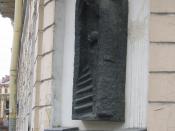PERSONAL MOTIVE vs. SOCIETAL INFLUENCES
Bourgeois society enslaves one such that any attempt to transcend the induced limitations results in self-destruction. In The Stranger by Albert Camus, Meursault's lack of a local cause, motivation, and personal means of justification for his crime offers the possibility of such an outside force pulling him towards the direction of wrongdoing. Raskolnikov of Fyodor Dostoevsky's Crime and Punishment contrasts himself with Meursault in that he continually wrangles with himself over the motivation of his crime. On the other hand, Raskolnikov is also unable to find a plausible explanation, hence opening the door to other likely reasons. In both novels, one such likely reason is the influential force of society, a force which molds and shapes the individuals within it to think a certain way, act a certain way, and live a certain way. Camus and Dostoevsky have both written novels that successfully criticize these aspects of their societies.
Through analysis of the causes and motives in The Stranger and Crime and Punishment, the destructive society of the times positions itself as the major strength and motive behind Mersault and Raskolnikov's criminal activities as well as the final arbitration of their punishments.
The Stranger lacks a concrete cause to rationalize Meursault's murder of the Arab. Mersault does not seem to ascribe himself with racial hatred, a wish for revenge, or feelings from Maman's death. When he comes face to face with the Arab, he thinks to himself that "As far as I was concerned, the whole thing was over, and I'd gone there without even thinking about it"(Camus, 58), refuting the notion that he was motivated by revenge. He also arrives at the realization that "really, nothing had changed"(Camus, 24) after Maman's death, proving that Meursault was not impelled by the death of...


